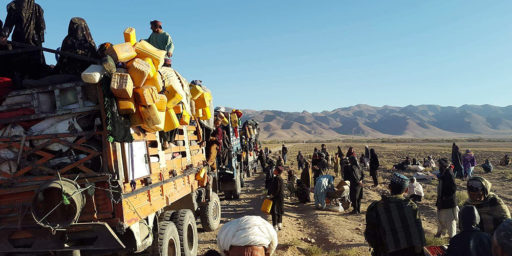Terrorists are Different
So says White House Counsel Alberto R. Gonzales in an op-ed in USA Today.
The conflict with al-Qaeda and the Taliban presents a situation very different from the conflict in Iraq. The Third Geneva Convention confers the protected status of “prisoner of war” on captured combatants from armed forces that fight on behalf of states that are parties to the convention and meet the convention’s standards. It does not confer POW status on terrorists, such as al-Qaeda, who fight on behalf of no state and seek to kill innocent civilians.
Although Afghanistan is a party to the convention, the president determined that the Taliban fighters were not entitled to POW status under the convention. It provides that combatants must, among other things, distinguish themselves from civilians, which the Taliban clearly did not.
While determining that al-Qaeda and the Taliban were not entitled to treatment as POWs, the president, nevertheless, reaffirmed that our armed forces were to treat al-Qaeda and Taliban detainees at Guantanamo Bay, Cuba, humanely and, to the extent appropriate and consistent with military necessity, in keeping with the principles of the Third Geneva Convention.
In the war on terror, we confront an enemy that seeks to inflict large-scale civilian casualties by surprise attack. Gathering intelligence about the plans of these mass murderers is critical to defending America. To confer the special privileges of POW status upon terrorists would reward those who, by hiding among civilian populations, undermine the convention’s basic objective of protecting innocent citizens, and it would only encourage terrorists to continue to violate the laws of war.
In principle, this is absolutely correct. Indeed, I’d argue that most of the people our forces now fight in Iraq–as opposed to Saddam Hussein’s uniformed army–falls into the same category. Cowards who hide among civilians and use sanctuaries such as mosques and museums to conduct military operations are not soldiers and do not deserve the treatment of honorable combatants.
Practically, however, the situation is murkier. While I have no problem with using demanding interrogation techniques (sleep deprivation and so forth) on these people, abuses such as took place at Abu Ghraib are unacceptable. If we’re to have several classes of prisoners, it’s vital that those who guard and handle them be trained as to what the rules are. Furthermore, such prisoners should be segregated from ordinary enemy prisoners of war so that there is no danger of blurring the lines.






Agreed.
We should also be careful not to lump all the Abu Ghraib conduct together; some was criminal, but not everything that happened there was an “atrocity.”
Some of it was definitely unacceptable (e.g., sexual abuse). But some of it was not and was more akin to a frat prank (e.g., putting pink underwear on a guy’s head). Still other conduct is unclear from the photographs (e.g., there was a picture of a prisoner surrounded by soldiers and a couple dogs, hard to tell what the dogs were doing in the pictures, standing guard or actually threatening).
Gonzalez is a lying sycophant. He told Bush what he wanted to hear, rather than any sort of professional standard of truth.
Gonzalez says in this article (and in his previous memos to the President, I believe) that the Geneva convention might not apply to terrorists we catch, and we can get away with torturing them. What he doesn’t say is that there are several other sources, including the Uniform Code of Military Justice, federal law, and international treaties the US has signed & ratified that explicitly forbid torture. Of anyone. Under any circumstances.
—